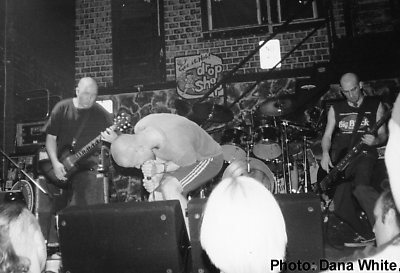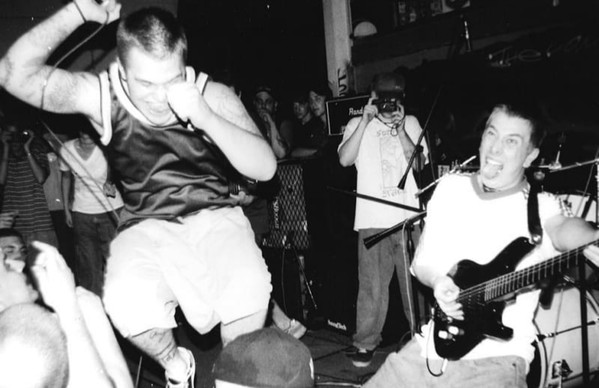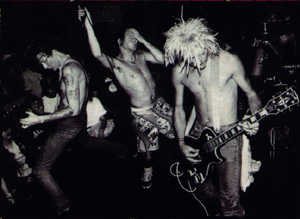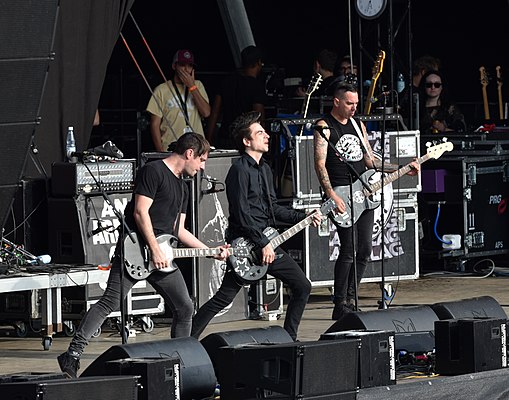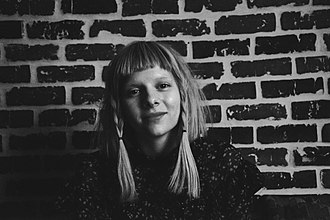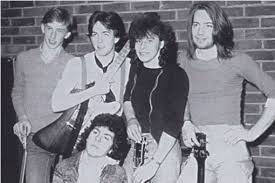Big Black
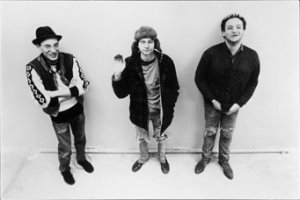
Big Black was an American punk rock band from Evanston, Illinois, active from 1981 to 1987. Founded first as a solo project by singer and guitarist Steve Albini, the band became a trio with an initial lineup that included guitarist Santiago Durango and bassist Jeff Pezzati, both of Naked Raygun. In 1985, Pezzati was replaced by Dave Riley, who played on Big Black’s two full-length studio albums, Atomizer (1986) and Songs About Fucking (1987).
Big Black’s aggressive and abrasive music was characterized by distinctively clanky guitars and the use of a drum machine rather than a drum kit, elements that foreshadowed industrial rock. The band’s lyrics flouted commonly held taboos and dealt frankly—and often explicitly—with politically and culturally loaded topics including murder, rape, child sexual abuse, arson, racism, and misogyny. Though controversial, the lyrics were meant as commentary or a display of distaste for these subjects. The band was staunchly critical of the commercial nature of rock, shunning the mainstream music industry, insisting on complete control over their career, booking their own tours, paying for their own recordings, refusing to sign contracts, and avoiding traditional corporate trappings. This independence had a significant impact on the aesthetic and political development of independent and underground rock music.
In addition to two studio albums, Big Black released two live albums, two compilation albums, four EPs, and five singles, all through independent record labels. Most of the band’s catalog remained in print through Touch and Go Records for years following their breakup.
History
1981–1982: Formation and Lungs
Big Black was founded by Steve Albini in 1981 during his second year of college at Northwestern University. Albini, a punk rock fan from his high school years in Missoula, Montana, taught himself to play bass guitar while recovering from a severe leg injury in 1979. After moving to Evanston, Illinois to study journalism and fine art, he immersed himself in the Chicago punk scene and became a devoted fan of Naked Raygun. He DJ’d at his campus radio station, often clashing with administration due to his choice of loud, abrasive music and controversial rants in his column “Tired of Ugly Fat?” for the zine Matter.
Albini began experimenting with music, purchasing a Roland TR-606 drum machine to exploit its ability to play fast, steady beats without tiring. Unable to find musicians who could satisfy his vision, he recorded the Lungs EP by himself during spring break in 1981, handling guitar, bass, vocals, and drum machine programming. Influenced by Cabaret Voltaire, Killing Joke, and the Cure, the EP was described as “cold, dark, and resolutely unlistenable” and contained lyrics about disturbing subjects. Albini later expressed regret over its artistic quality.
He chose the name Big Black to evoke the image of a large, scary, ominous figure—drawing on childhood fears. He briefly recruited Minor Threat guitarist Lyle Preslar, but they proved musically incompatible. Albini then passed the Lungs tape to John Babbin of Ruthless Records, who released 1,500 copies in December 1982 with eccentric inserts like dollar bills and used condoms.
1983: Full Lineup and Bulldozer
In early 1983, Albini met Naked Raygun singer Jeff Pezzati, convincing him to join Big Black on bass. Guitarist Santiago Durango also joined, forming a unit that refined Albini’s song ideas. To record their next EP, Albini enlisted drummer Pat Byrne from Urge Overkill to accompany the drum machine, nicknamed “Roland.” Using metal guitar picks notched with sheet metal clips, Albini achieved a signature “clanky” guitar sound. The resulting Bulldozer EP, released in December 1983, featured lyrics drawing on Albini’s rural upbringing, such as in “Cables” and “Pigeon Kill”.
1984: Touring and Label Signing
Despite the release of Bulldozer, Big Black struggled to draw large crowds in Chicago and began touring outside the city, playing in Madison, Minneapolis, Detroit, and Muncie. Albini managed logistics himself, booking shows on the East Coast and later a European tour that garnered acclaim in the UK press. Although gaining popularity, they felt resentment from Chicago locals who previously snubbed them. Their aggressive sound and Albini’s provocative lyrics alienated some, causing friction within the local scene.
Albini and the band maintained a fiercely independent approach, refusing traditional contracts, managers, and agents. They negotiated a deal with Homestead Records that allowed them to license recordings for limited times without losing rights, reflecting their punk ethos. This allowed them to avoid corporate entanglements, share profits among fewer members, and maintain creative control while touring extensively in 1984.
1985–1986: Racer-X and Atomizer
In late 1984, after recording the Racer-X EP, bassist Jeff Pezzati left amicably, and Dave Riley joined Big Black in April 1985. Riley’s background in funk and studio work brought a new dimension to the band’s sound as they recorded their first full-length album, Atomizer (1986). This album marked a peak in their musical aggression and development. Songs like “Big Money,” “Bazooka Joe,” and “Jordan, Minnesota” showcased dark narratives about corruption, violence, and sociopathy, with Riley’s funk influence adding melodic and rhythmic depth. The track “Kerosene” became emblematic of their sound, with critics praising its intensity and distinctive guitar work.
Atomizer was polarizing but achieved underground success, with strong sales and critical acclaim. Big Black secured European distribution through Blast First and experienced enthusiastic reception on their 1986 European tour.
1987: Headache, Songs About Fucking, and Breakup
Big Black’s first release for Touch and Go Records was the Headache EP in spring 1987, notable for its provocative cover art and packaging. Despite recycling themes from Atomizer, the band felt creatively stagnant. Internal tensions rose due to Dave Riley’s excessive drinking, conflicts over reliability, and the challenges of balancing college, day jobs, and the band’s demands. As guitarist Santiago Durango planned to leave for law school, the decision was made to disband rather than risk commercial overreach.
Announcing their breakup in advance, Big Black recorded their final album, Songs About Fucking, partly in London and at Albini’s home studio. Their final tours in 1987 took them across Europe, the UK, Australia, and the US. Memorable performances included a sold-out London show with members of Wire joining onstage and a final Seattle show on August 9, 1987, where they famously smashed their instruments onstage. Songs About Fucking was released shortly after and became their most successful record.
Post-Big Black and Legacy
After the breakup, Steve Albini continued to shape the music world through bands like Rapeman and Shellac, and as a revered recording engineer, working with major acts such as Nirvana and PJ Harvey. Santiago Durango pursued law while occasionally engaging in music projects. Dave Riley faced health challenges, documented his experiences in a blog, and passed away in 2019. Albini opened Electrical Audio studio in 1997, known for its distinctive recording style and minimalistic credit practices.
Big Black’s catalog was reissued and kept in print by Touch and Go Records. In 2006, Albini and Durango reunited with original bassist Jeff Pezzati for a short Big Black set at Touch and Go’s 25th Anniversary festival, honoring the label’s legacy. Despite offers for further reunions, Albini declined, wanting to preserve the integrity of the band’s history.
Style and Influence
Musically, Big Black challenged conventions with their abrasive, intense sound that blended hardcore punk with post-punk, noise rock, and industrial elements. Their innovative use of a drum machine and “clanky” guitar tones created a distinctive, relentless rhythm section that influenced countless bands in the indie and industrial scenes. The band’s confrontational lyrics and provocative performances pushed boundaries and set a standard for freedom of expression in underground music.
Big Black’s legacy lies not only in their recordings but also in their steadfast independence, refusal to compromise on artistic vision, and the blueprint they provided for future generations of independent musicians. Their impact on the indie rock and noise rock genres remains profound, and their approach to the music industry influenced many bands to pursue similar paths of autonomy.
Members
- Steve Albini – vocals, guitar, drum machine programming (1981–1987; died 2024); bass guitar (1981–82)
- Jeff Pezzati – bass guitar, backing vocals (1983–84)
- Santiago Durango – guitar, backing vocals (1983–1987)
- Dave Riley – bass guitar, backing vocals (1985–1987; died 2019)
Discography
Studio Albums
- Atomizer (1986, Homestead Records)
- Songs About Fucking (1987, Touch and Go Records)
EPs
- Lungs (1982, Ruthless Records)
- Bulldozer (1983, Fever Records)
- Racer-X (1985)
- Headache (1987, Touch and Go Records)
Live Albums
- Sound of Impact (1987, Walls Have Ears)
- Pigpile (1992, Touch and Go Records)
Compilation Albums
- The Hammer Party (1986, Homestead Records)
- The Rich Man’s Eight Track Tape (1992, Touch and Go Records)
Singles
- Various singles released between 1983 and 1987
Other Appearances
- Contributions to compilations and a video album
